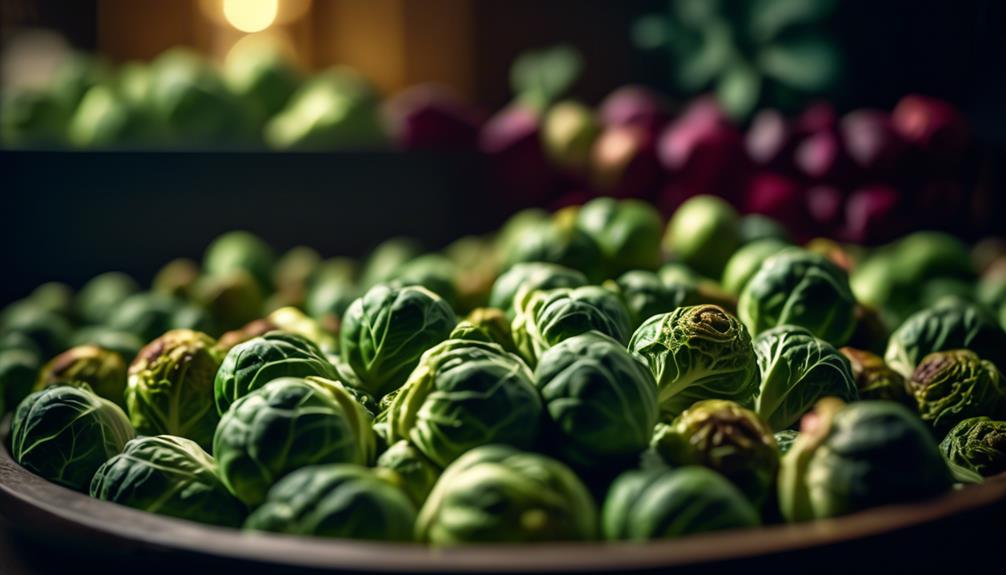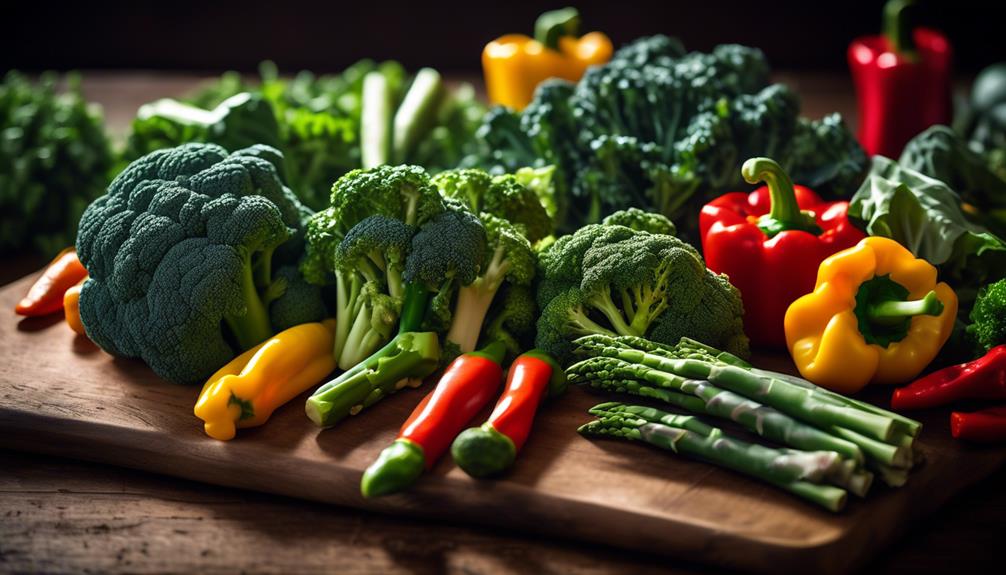Are you tired of trying to find the perfect balance between healthy and satisfying when it comes to your vegetable choices?
Well, look no further, because we've got the lowdown on the best high-fiber, low-carb veggies that will have you feeling full and satisfied without compromising your health goals.
From the crunchy goodness of broccoli to the leafy green powerhouse of spinach, we've got your taste buds covered.
But that's not all, there are a few surprising contenders on this list that might just make you rethink your vegetable game.
So, get ready to elevate your plate with these nutrient-packed veggies that will leave you wanting more.
Broccoli

Broccoli is a versatile and nutritious vegetable that can be enjoyed as a high-fiber, low-carb option in your diet. With its vibrant green color and unique texture, broccoli can be incorporated into a variety of delicious recipes. Whether you prefer it raw, steamed, or roasted, this cruciferous vegetable offers numerous health benefits.
One of the main advantages of including broccoli in your diet is its high fiber content. Fiber is essential for maintaining a healthy digestive system and can help prevent constipation. Additionally, the fiber in broccoli can aid in weight management by promoting feelings of fullness and reducing overeating.
Broccoli is also a great source of vitamins and minerals. It's rich in vitamin C, which boosts the immune system and promotes collagen production for healthy skin. It also contains vitamin K, which is important for bone health and blood clotting. Furthermore, broccoli provides a good amount of folate, which is essential for cell growth and development.
To enjoy the health benefits of broccoli, try incorporating it into your favorite recipes. You can add it to stir-fries, salads, soups, or even make a delicious broccoli and cheese casserole. Experiment with different cooking methods to find the one that suits your taste buds best.
Spinach
If you enjoyed the versatility and nutritional benefits of broccoli, you'll be pleased to know that spinach is another high-fiber, low-carb vegetable that can be a valuable addition to your diet. Here are four reasons why you should consider incorporating spinach into your meals:
- Rich in Fiber: Spinach is an excellent source of dietary fiber, with 2 grams of fiber per cup. A high-fiber diet can aid in digestion, promote bowel regularity, and help control blood sugar levels.
- Low in Carbohydrates: With only 3.6 grams of carbs per cup, spinach is a great choice for those following a low-carb diet. It allows you to enjoy a generous portion while keeping your carb intake in check.
- Packed with Nutrients: Spinach is a nutrient powerhouse, providing an array of vitamins and minerals. It's particularly rich in vitamin K, vitamin A, folate, and iron. These nutrients contribute to bone health, eye health, cell function, and energy production.
- Versatile and Delicious: Spinach can be enjoyed in a variety of ways. You can use it in salads, add it to smoothies, sauté it as a side dish, or incorporate it into soups and stews. There are countless spinach recipes available that can help you incorporate this nutritious vegetable into your meals.
Brussels Sprouts

Brussels sprouts are packed with essential nutrients, making them a great addition to your low-carb, high-fiber diet. These mini cabbages are rich in vitamins C and K, as well as folate and fiber, which support overall health and digestion.
To maximize their nutritional benefits, try roasting or sautéing Brussels sprouts, and consider serving them as a side dish or incorporating them into salads or stir-fries.
Nutritional Benefits
With their rich nutritional profile, Brussels sprouts offer a multitude of health benefits. Incorporating Brussels sprouts into your low-carb diet can boost your fiber intake and provide you with essential nutrients. Here are four reasons why Brussels sprouts should be on your plate:
- High in fiber: Brussels sprouts are an excellent source of fiber, which aids in digestion and helps maintain a healthy weight.
- Low in carbs: With only 5 grams of carbs per cup, Brussels sprouts are a suitable choice for those following a low-carb diet.
- Packed with vitamins: These cruciferous vegetables are packed with vitamins C and K, which support immune function and bone health.
- Rich in antioxidants: Brussels sprouts contain antioxidants that protect your cells from damage, reducing the risk of chronic diseases.
Incorporating Brussels sprouts into your meals can enhance your overall health and support your low-carb lifestyle.
Cooking Methods
To explore the various cooking methods for Brussels sprouts, you can easily elevate their flavor and texture while retaining their nutritional benefits. Roasting vegetables, including Brussels sprouts, is a popular method that enhances their natural sweetness and brings out a crispy texture.
To roast Brussels sprouts, simply toss them in olive oil, season with salt and pepper, and spread them out on a baking sheet. Bake at 425°F (220°C) for about 20-25 minutes, or until they're tender and slightly charred.
Steaming vegetables, on the other hand, is a gentle cooking method that helps retain their nutrients. To steam Brussels sprouts, place them in a steamer basket over boiling water and cook for about 6-8 minutes, until they're tender but still slightly firm.
Both roasting and steaming are great cooking methods for Brussels sprouts that provide delicious results while preserving their nutritional value.
Serving Suggestions
For a nutritious and satisfying side dish, consider incorporating Brussels sprouts into your meals with these creative serving suggestions.
- Roasted Brussels Sprouts: Toss halved Brussels sprouts with olive oil, salt, and pepper. Spread them in a single layer on a baking sheet and roast at 400°F for 20-25 minutes, or until they're golden brown and crispy on the outside. This roasting technique brings out their natural sweetness and adds a delicious crunch.
- Brussels Sprouts Slaw: Slice Brussels sprouts thinly and toss them with your favorite slaw dressing. Add shredded carrots, sliced almonds, and dried cranberries for extra flavor and texture. This refreshing and colorful slaw is perfect as a side dish or as a topping for sandwiches and burgers.
- Brussels Sprouts Stir-Fry: Heat a tablespoon of oil in a skillet over medium-high heat. Add thinly sliced Brussels sprouts, along with your choice of vegetables and protein. Stir-fry until the Brussels sprouts are tender-crisp and lightly charred. Serve with a drizzle of soy sauce or your favorite stir-fry sauce.
- Meal Prep Roasted Brussels Sprouts: Preheat your oven to 425°F. Toss Brussels sprouts with olive oil, salt, and pepper. Spread them on a baking sheet and roast for 20-25 minutes. Let them cool completely before storing in an airtight container in the refrigerator. These meal prep roasted Brussels sprouts can be enjoyed throughout the week as a quick and healthy side dish or added to salads and grain bowls.
Cauliflower

Cauliflower offers a versatile and nutrient-packed addition to any high-fiber, low-carb diet. Not only is it low in carbohydrates, but it's also high in fiber, making it an excellent choice for those looking to increase their fiber intake. Additionally, cauliflower is rich in vitamins C and K, as well as folate, which are essential for overall health and well-being.
One of the great things about cauliflower is its ability to be transformed into a variety of dishes. From cauliflower rice to cauliflower pizza crust, the possibilities are endless. By substituting cauliflower for higher-carb options, you can still enjoy your favorite dishes while keeping your carb intake in check.
In terms of health benefits, cauliflower has been linked to various positive outcomes. For instance, it has been shown to have anti-inflammatory properties and may help reduce the risk of chronic diseases such as heart disease and cancer. Additionally, the fiber in cauliflower can aid in digestion and promote a healthy gut.
To incorporate more cauliflower into your diet, try experimenting with different cauliflower recipes. Whether you roast it, mash it, or use it as a base for soups and stews, this versatile vegetable is sure to add both flavor and nutrition to your meals.
Kale
Kale is a nutrient powerhouse, packed with vitamins A, C, and K, as well as fiber and antioxidants. It's low in carbs and calories, making it a great choice for those following a low-carb or keto diet.
Incorporating kale into your meals is easy – you can add it to smoothies, salads, soups, or sauté it as a side dish.
Nutritional Benefits of Kale
With its abundance of nutrients and health benefits, kale is a versatile and nutrient-dense leafy green vegetable. Here are four reasons why incorporating kale into your diet can be beneficial:
- Rich in fiber: Kale is an excellent source of dietary fiber, which can aid in digestion and promote a healthy gut.
- Packed with vitamins: This leafy green is loaded with vitamins A, C, and K, which play essential roles in maintaining good vision, supporting the immune system, and promoting healthy blood clotting.
- High in antioxidants: Kale contains powerful antioxidants, such as beta-carotene and flavonoids, which help protect cells from damage caused by free radicals and may reduce the risk of chronic diseases.
- Anti-inflammatory properties: Kale contains compounds that have been shown to have anti-inflammatory effects, which may help reduce the risk of diseases like heart disease and certain types of cancer.
Incorporating kale into your diet can be as simple as adding it to salads, soups, or smoothies, or even sautéing it as a side dish. Enjoy the numerous health benefits that this leafy green has to offer!
Ways to Incorporate Kale
There are many creative and delicious ways to incorporate this nutrient-dense leafy green vegetable into your diet.
One popular way is by making a kale smoothie. Simply blend together kale leaves, a banana, almond milk, and a spoonful of nut butter for a refreshing and fiber-rich drink.
Another option is to try different kale salad recipes. Mix chopped kale with your favorite veggies, such as cherry tomatoes, cucumber, and bell peppers. Add some protein like grilled chicken or chickpeas and toss with a light vinaigrette dressing.
The possibilities are endless! By incorporating kale into your diet through smoothies and salads, you can enjoy its numerous health benefits, including high fiber content and an abundance of vitamins and minerals.
Bell Peppers

Bell peppers, packed with vitamins and fiber, are a versatile and nutritious addition to any low-carb diet. Here are four ways you can enjoy the benefits of bell peppers while keeping your carb intake in check:
- Roasted peppers: Roasting bell peppers brings out their natural sweetness and enhances their flavor. Simply slice them, remove the seeds, and place them on a baking sheet. Drizzle with olive oil and season with salt and pepper. Roast in the oven until they're tender and slightly charred. Enjoy them as a side dish or add them to salads for an extra burst of flavor.
- Stuffed peppers: Bell peppers make the perfect vessel for a low-carb stuffing. Cut off the tops, remove the seeds, and stuff them with a mixture of lean protein, such as ground turkey or quinoa, and vegetables like spinach or mushrooms. Bake until the peppers are tender and the filling is cooked through. It's a satisfying and nutritious meal that's easy to prepare.
- Raw peppers: Don't forget to enjoy bell peppers in their raw form. They make a crunchy and refreshing addition to salads, wraps, and vegetable platters. Slice them into strips or bite-sized pieces for a healthy snack option.
- Pepper stir-fry: Incorporate bell peppers into your stir-fry dishes for a pop of color and crunch. Slice them thinly and cook them with other low-carb vegetables like broccoli, zucchini, and mushrooms. Add your choice of protein and season with soy sauce or other low-carb sauces for a quick and flavorful meal.
Incorporating bell peppers into your low-carb diet not only adds variety to your meals but also provides you with essential nutrients and fiber. So go ahead and enjoy the many delicious ways to include bell peppers in your low-carb eating plan.
Conclusion
In conclusion, these high-fiber, low-carb veggies aren't only delicious but also offer a range of health benefits.
Incorporating broccoli, spinach, Brussels sprouts, cauliflower, kale, and bell peppers into your diet can help improve digestion, promote weight loss, and support overall gut health.
So, why not add a generous serving of these nutrient-packed veggies to your plate and enjoy their euphoric effects on your well-being?







